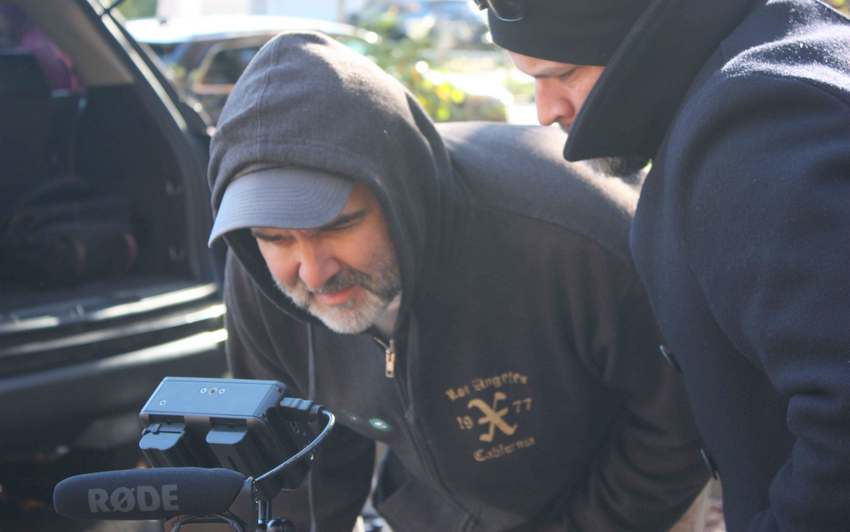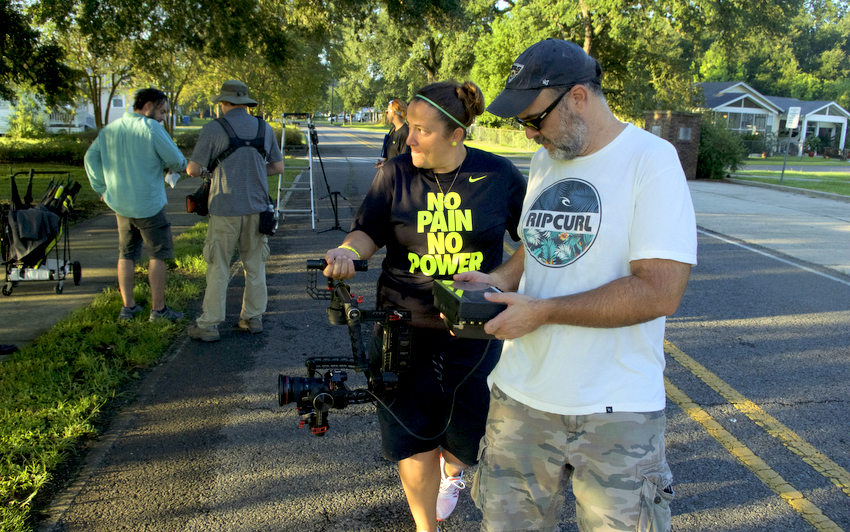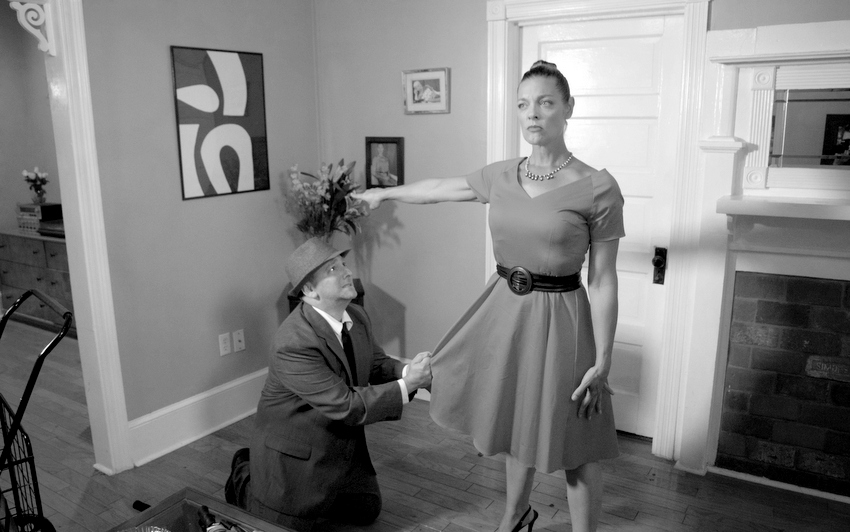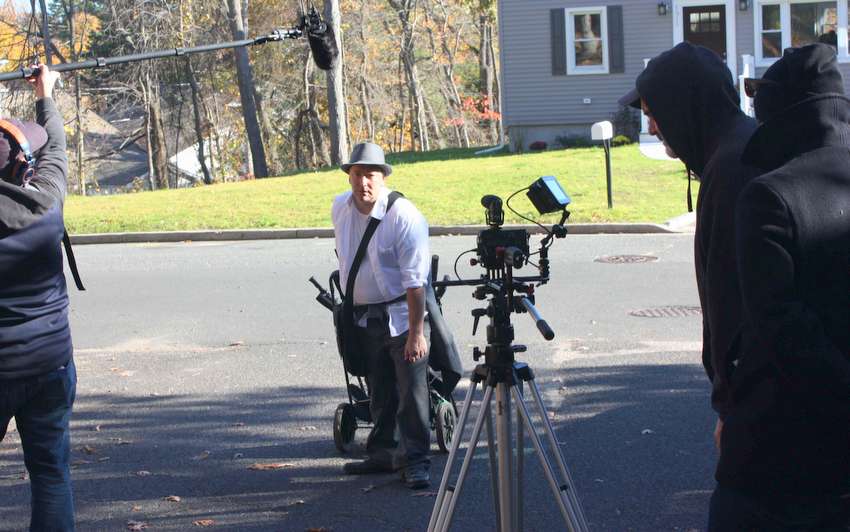
indieactivity : Give a background of your personal experience with the story, writing, production and marketing?
Steve Herold : The germ of the idea came driving my friend Patrick and his wife to the airport. I was using their car and was going to drop it back at their house after I dropped them off. So we get to the airport and they open the trunk and Patrick has like ten umbrellas in his car.
I found this funny because most people don’t even have one umbrella in their car let alone ten. It looked like how you’d imagine a door-to-door umbrella salesman’s trunk looking. Anyway on the drive back that idea of not just a door-to-door salesman but one who’s selling umbrellas stuck in my mind. It seemed like a great idea to latch onto some poor schlep. Like what’s the worst possible dead-end gig you could have?
Related Story : Steve Herold’s “Death of an Umbrella Salesman” is a short to watch
indieactivity : Did you start writing with a cast (You or any) in mind?
Steve Herold : I’ve worked with lead actor Kevin Kolack numerous times before and he’s always on my mind to act in anything we do. No offense to him, but we needed someone who could really capture the sad sack nature of this guy and I knew Kevin could knock it out of the park.
Although I didn’t set out to cast Sabrina Gennarino once I knew we’d be shooting this in Baton Rouge (she was in New Orleans at the time) there was no question I’d call upon her to play the role of Betsy May. Again, like Kevin she’s an awesome actor and there was no question she could nail the role. Plus I genuinely love working with them both. We’ve done it a few times and it’s always a blast collaborating with them.

indieactivity : How long did you take to complete the script? (Do you have a writing process?) >br>Steve Herold : James Palmer and I started writing the script in early 2015. It was actually one of four short film scripts I was working on. I had a plan to just go into a production blitz making these shorts back-to-back…. All of that was laying foundation to eventually make a feature. This one was the first script we started writing and I think we had a decent draft within a month.
When we begin writing I’d love to say we just start by figuring everything out about the character (backstory, etc) and then move on to the plot. But it never really happens that way. I always collaborate because I hate to write. I’d rather talk with someone else and just throw ideas around. I always record these conversations and then I can go back and transcribe them for the ideas that work. Then, we create a scene outline.
I’ve been doing it that way since film school. Not really a treatment but similar. Just list each scene one by one in order and what happens in them. That’s basically our guideline when we start writing the actual script.
So after we finished that first draft I shelved it because it wasn’t going to be the first one we shot. We made one of them called “Improv For One” and then I was prepping the next which was titled “Cheat Day.” My plans changed, as they often do when it comes to filmmaking, and I found myself in Baton Rouge in 2016 working on a TV show. I knew we’d be there for at least six months so I decided we’d shoot one of the shorts there.
“Death of an Umbrella Salesman” for some reason felt like the right one to do. Because a lot of it takes place outside, I thought it’d give me the chance to use the location as I’m not a local and have shot almost all of my films in New Jersey. So once that was decided we dug up the script and got to rewriting. I think we spent another month tearing it apart and shifting things to come up with the final shooting script.

indieactivity : When did you form your production company – and what was the original motivation for its formation?
Steve Herold : I started Joint Partners back in 2000. Originally I was hoping it would form into a group of people all helping each other make some films. It’s kinda of turned out that way, I work with a lot of the same people.
indieactivity : What was the first project out of the gate?
Steve Herold : Our first film was the festival darling “H.R. Pukenshette” a gross-out comedy paying homage to the 70s TV shows of Sid and Marty Krofft. That’s where I first auditioned both Kevin Kolack and Sabrina Gennarino who star in “Death of an Umbrella Salesman.” The film did really well with festivals and got us into meetings with some pretty high level producers in Hollywood. We had some feature scripts bouncing around at one point off of that movie but unfortunately nothing really came of them.
indieactivity : During production, what scene (that made the cut) was the hardest to shoot?
Steve Herold : I think the scene between Kevin and Sabrina was the most difficult. Although I’m very happy with how the scene turned out I give almost all of that credit to those two actors because they’re pros. I think I really dropped the ball on that one by not having a full on rehearsal. I think I wasn’t as prepared as I should’ve been and a rehearsal definitely would’ve helped me just get a better feeling for the scene and it would’ve allowed me to support them better as a director. Like I said they knocked it out of the park in the end but I just think I personally wasn’t on my game when we shot that scene.
indieactivity : What works better in this latest production that mightn’t have worked so well in the last one you did?
Steve Herold : I think with every film you make you get a little better as a filmmaker. That’s why I always tell people who want to make films to just go make them. We all have phones in our pockets that shoot pretty good video. We all easily have access to non-linear editing software. Just shoot short little films with your friends and figure things out.
Figure out angles, figure out pacing, figure out ways to edit that maybe weren’t how you thought you were going to originally. Having said that, I think with this one I tired to spend more time on the look of the film. I really concentrated on the shots maybe more than I ever had before. It helped that I had two great DPs to work with in Jessica Gurney and Logan Hodson. They both certainly made it easier for me to kind of step up my game on that front.

indieactivity : You produced and directed the film, what measure of input did it take to don these hats?
Steve Herold : I just naturally feel that if I’m directing I also want to be producing. I want my hand in every jar. I want to be sure that what needs to get done is getting done properly. I enjoy putting the film together as a whole. From hiring cast and crew to working on shot lists, storyboards. Even going over what we need for crafty. At this level sometimes a lot of your crew are wearing multiple hats so I’m not the only one.
Of course I recognize that it’s good to delegate responsibilities and you have to. You’ll go insane if you don’t. I’ve been lucky to work with some good people over the years that were there to support me on that level. On this film, early in the process Tanner Short came through with helping me find locations. During the actual filming my assistant director Danielle Hoffmann was on point making sure everything ran smoothly. So as much as I like being in charge of all of these things, it helps having strong support when we start shooting so that I can maybe take the producer hat off a little and concentrate on the directing.
indieactivity : Is there anything about the independent filmmaking business you still struggle with? Steve Herold : One thing I personally struggle with is trying to keep my ideas within my means sometimes. At this level you have to be aware of what you can and can’t pull off. I think it’s always good when you’re going to be working with a limited budget to think about what you have access to and trying to create a story around that.
I have a tendency not to do that and when it comes time to put the film together the production just takes on this bigger scale and it can get overwhelming at times. Be it multiple locations, large casts, etc. I sometimes envy those filmmakers who create a film with like two characters all set in one location that’s indoors.
indieactivity : Where do you think your strengths line as a filmmaker?
Steve Herold : I think from very early on when I was writing with my old friend Kurt Christiansen up through now working with Palmer I’ve always had a sort of different take on things especially when it comes to comedy. A lot of it was shaped back in the day when I saw a British TV show called “The Young Ones.” The show just had an anything goes, nothing is off limits attack on comedy quality that really appealed to me. Here in the US, at the time, the closest thing to it was maybe “It’s Garry Shandling’s Show” or later the Chris Elliott sitcom “Get A Life.” I like to think I’m carrying on a tradition those people started. I like to think I have a unique point of view and put it into my films.
indieactivity : Let’s talk finance, How did you finance the film?
Steve Herold : I financed the film myself, out of pocket. Palmer contributed some money while we were in post-production and Stephen Hicks another friend who’s worked on some of my films helped with some money when we were submitting to festivals. I haven’t tipped my toe in crowd funding yet for filmmaking. Mostly, because I feel a good portion of that will come from friends and family and I think you really only have one shot at asking them for money to help make your film. I’d rather not use that opportunity on a short film, I’d rather save it for when we’re trying to finance a feature. So the day will come when I’m going to go down that crowd funding path and dive in but it’ll be for a feature.
indieactivity : How much did you go over budget? How did you manage it?
Steve Herold : I was very lucky in that I had a great crew who were working for a discounted rate because they, I guess, believed in me and the film. Our main DP Jessica and our associate producer Tanner came through big time in getting us some camera and grip equipment for nothing. I also was able to take advantage of the shows we were all working on at the time and borrow some stuff here and there.
Even our sound mixer Steven McRoberts who I didn’t know and just hired out of Dallas gave me a reasonable rate. Having said that, I still probably went over my original budget by $2,000. That’s when I hit up Palmer who not only co-wrote but was doing the music for the film. He came through with some funds to help and then like I mentioned Stephen Hicks helped us out with some festival fee money.
indieactivity : How important is marketing? Do you think a project can make any dent without it these days?
Steve Herold : Marketing is all-important. And this isn’t just about trying to spread the word through social media. It starts with finding the right image for your main still that will rep the film and the right poster image. These are the initial things that will draw an audience in. Also these days it’s good, even with a short film, to have an intriguing trailer to post online. I don’t know how any film can make any dent without marketing. We make films cause we want people to see them. Big or small. Without marketing how is that audience going to know your film exists?
indieactivity : Can you tell us about your marketing activities on the project – and how it’s gone for you?
Steve Herold : Right off the bat we try our best to stand out as much as possible on the main ones: Facebook, Instagram and Twitter. It’s not easy. I think more people who know nothing about me or the film will find it on Instagram mainly because I think hashtags still work on that platform as opposed to the others. It also helps to engage other filmmakers and film fans to try to draw some attention your way.
We lucked out in that right as our film was starting to make the rounds at festivals Sabrina was cast in “The Walking Dead” which brought some eyes our way. I reach out to any film outlet I can to try to get press coverage. This time I’ve been reaching out to podcasts as well to try and guest. I did a few of those, my favorite being “Making Movies is Hard.” I had a great time talking with the hosts of that show. When we get into a festival the first thing I do is reach out to the local papers in that town and try and get them to write something about our film.
That works more often than you’d think and I’m shocked when I hear no other filmmakers are doing that. It also helps to try and get posters and postcards out at local businesses. If you’re not personally able to do it, reach out to the fest and see if they can put you in touch with someone to do it for you. All of these things go into spreading the word about your film. We just got “Death of an Umbrella Salesman” up on Amazon Prime and now all of this social media and trying to get press starts all over again.
indieactivity : What do you hope audiences get from your film?
Steve Herold : I like the character of Stanley Grimp. We can all relate to him, I think. We’ve all had those times in our lives where things maybe seemed hopeless. If Stanley Grimp can push on and find a little ray of sunshine we all can.
indieactivity : What else have you got in the works?
Steve Herold : We just finished shooting our next short film called “Waimea” in May. So right now I’m deep into post-production. Hopefully that’s done in August and we can start submitting this fall to festivals. Palmer and I are also in early stages of taking the main character from “Death of an Umbrella Salesman” and creating a feature film for him. It’s not going to be a 90-minute version of the short.
We’re creating this kind of bent reality where he exists and writing a story around that. We have some pretty cool ideas and I truly hope we can get that off the ground within the next two years. That’s always been the goal: to make a feature. I’ve thought about calling it a day at times. The cliché is true. Filmmaking is like being on a rollercoaster. One day, you feel great…. The next, you wonder if you’re wasting your time. But I feel like I can’t give up because the goal was to make a feature and until I do, just gotta keep on keepin’ on.
Follow Steve Herold on Social Media
Website
IMDb
Facebook
Twitter
Instagram
YouTube
Hello Stranger by Paul Raschid set for London Games Festival & BIFFF
The film Is set for an April 10th Premiere at The Genesis Cinema in London (LGF) and BIFFF
Daydreamers Official Trailer by Timothy Linh Bui: Released by Dark Star Pictures
Daydreamers Vietnamese Vampire Thriller – May 2nd release
Afternooner by The Harrow Brothers: Funniest Movie of the Decade on VOD & DVD April
Freestyle Acquires “Afternooner” for April Release
Where We Stay by Florence Bouvy to Screen at CIFF
Where We Stay | CIFF Selected Drama About Friends Hiding Unspoken Truths
This Place by V.T. Nayani: Two Women in Love for the First Time on VOD & DVD March 25
Freestyle Acquires “This Place” for March Release
Sonoma International Film Festival Wraps with Unforgettable Films, Culinary Cinema and Packed Pop-In Events
Sonoma International Film Festival Grand Jury and Audience Award Films Announced
Livestreams with Grandmapuzzles by Emily Sheskin to Screen at CIFF
CIFF Selected Documentary About Twitch Streaming Jigsaw Puzzler









